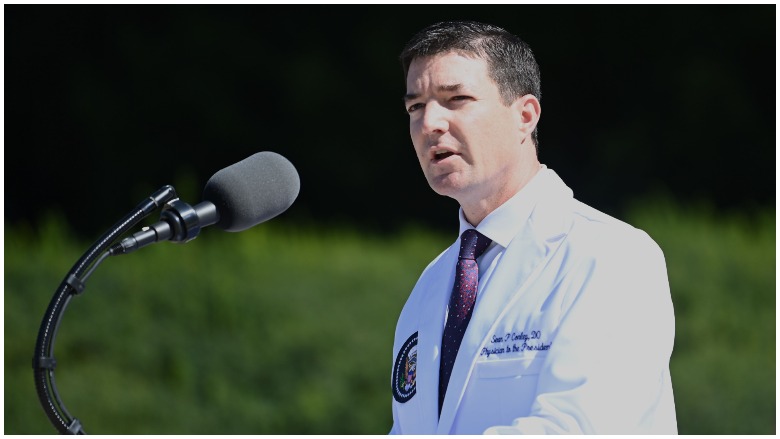
Dr. Sean Patrick Conley is the current White House physician. He became more well-known publicly as President Donald Trump battled the coronavirus.
Conley was the person who recommended Trump go to Walter Reed National Military Medical Center for treatment as a precaution, he explained during an October 3 news conference. Conley shared on October 4 in an update from the hospital that the president was prescribed a five-day course of the Remdesivir drug.
Trump left Walter Reed on October 5 and continued his treatment at the White House. Conley told reporters that day that Trump was “not entirely out of the woods yet,” as CBS News reported, and that Trump would “be surrounded by world-class medical care, 24/7” at the White House. Conley announced in an October 12 memo that Trump had tested negative for the virus and was no longer infectious to others.
Here’s what you need to know about the president’s doctor:
1. Sean Conley Is a Licensed Doctor of Osteopathic Medicine
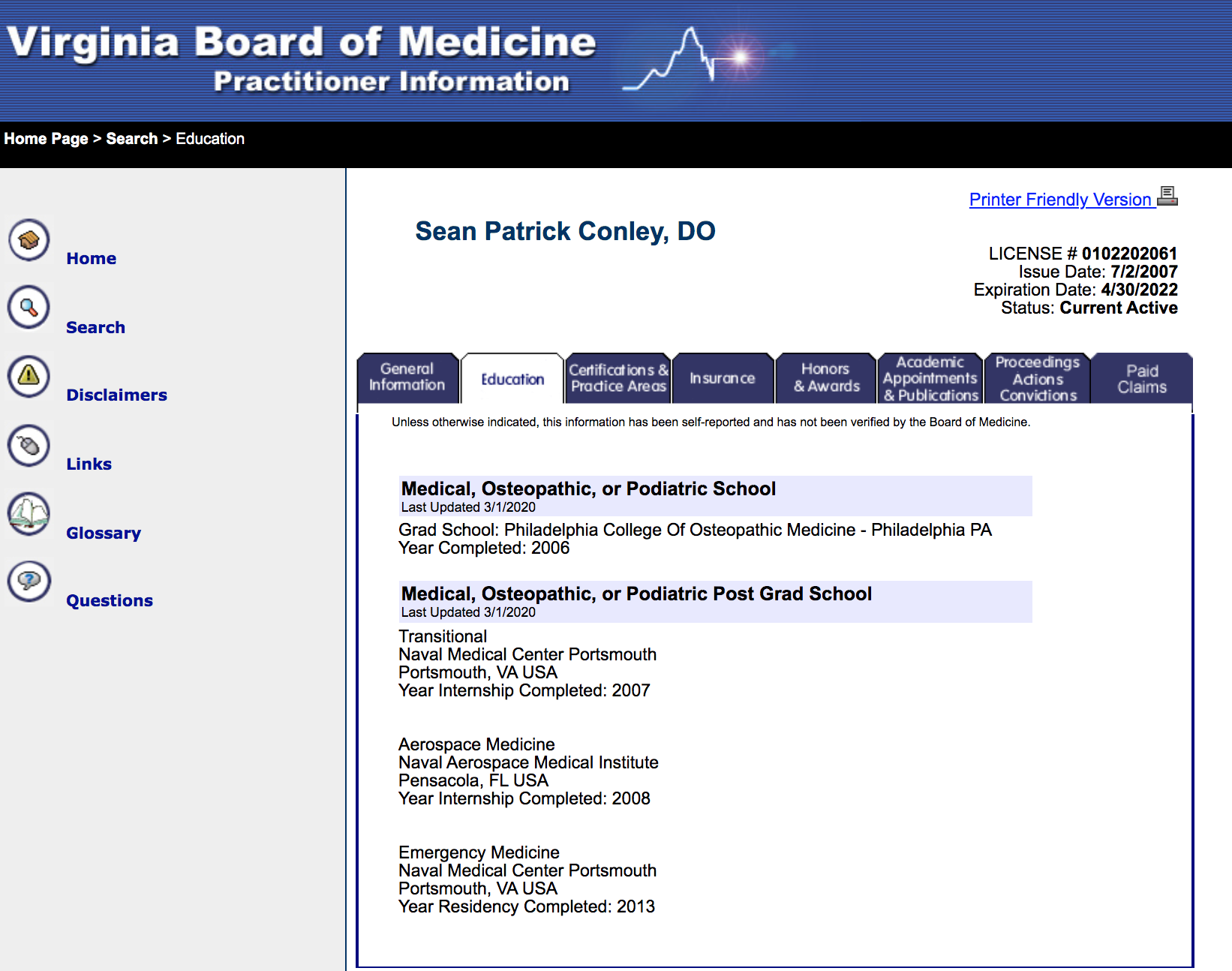
Virginia Board of Medicine Dr. Sean Conley’s credentials.
Conley is a certified doctor of osteopathic medicine, according to his profile on the Virginia Board of Medicine. The Mayo Clinic explained the difference between a D.O. and an M.D. on its website:
A doctor of osteopathic medicine (D.O.) is a fully trained and licensed doctor who has attended and graduated from a U.S. osteopathic medical school. A doctor of medicine (M.D.) has attended and graduated from a conventional medical school.
The major difference between osteopathic and allopathic doctors is that some osteopathic doctors provide manual medicine therapies, such as spinal manipulation or massage therapy, as part of their treatment.
After medical school, both M.D.s and D.O.s must complete residency training in their chosen specialties. They must also pass the same licensing examination before they can treat people and prescribe medications.
Conley graduated from the Philadelphia College Of Osteopathic Medicine in 2006, according to the Virginia Board of Medicine. He completed an internship in aerospace medicine at the Naval Aerospace Medical Institute in Pensacola in 2008. Conley specialized in emergency medicine for his residency program at the Naval Medical Center in Portsmouth, Virginia. He completed that program in 2013.
While at the Naval Medical Center, Conley was awarded the “Nurses’ Choice Award for Outstanding Senior Resident.” He also earned the “Resident Research Award” and “Honor Graduate Award.”
Conley’s Virginia Board of Medicine bio lists that he is “recognized by the American Board of Medical Specialties, Bureau of Osteopathic Specialists and Boards of Certification, the American Board of Multiple Specialties in Podiatry, or Council on Podiatric Medical Education.” Conley sees patients at Walter Reed National Military Medical Center.
2. Conley Served as an Emergency Physician in Afghanistan

Wikimedia CommonsDr. Sean Conley was awarded the Romanian Emblem of Honor in May 2014 for saving a Romanian soldier at Kandahar Airfield, Afghanistan.
Conley has used his medical skills in the military. He deployed to Afghanistan in 2014 after completing his residency program. According to The DO, a monthly magazine published by the American Osteopathic Association, Conley was “head of trauma for a NATO Multinational Medical Unit.”
Conley was awarded the Romanian Emblem of Honor after he and his team were credited for saving the lives of Romanian soldiers injured by an “improvised explosive device.”
Conley reflected on the experience in an interview with the U.S. Army: “It was the first time our team had seen a patient come in straight from the point of injury and only having tactical field care administered by a field medic. It was awesome to see how well the team reacted to a new situation,” Conley said. “It’s a reminder of the resiliency of the human body, and it’s amazing what you can do when you have the right tools and the team that works with efficiency to make it happen.”
3. Conley Addressed the President’s Decision to Take Hydroxychloroquine in an Official Memo in May
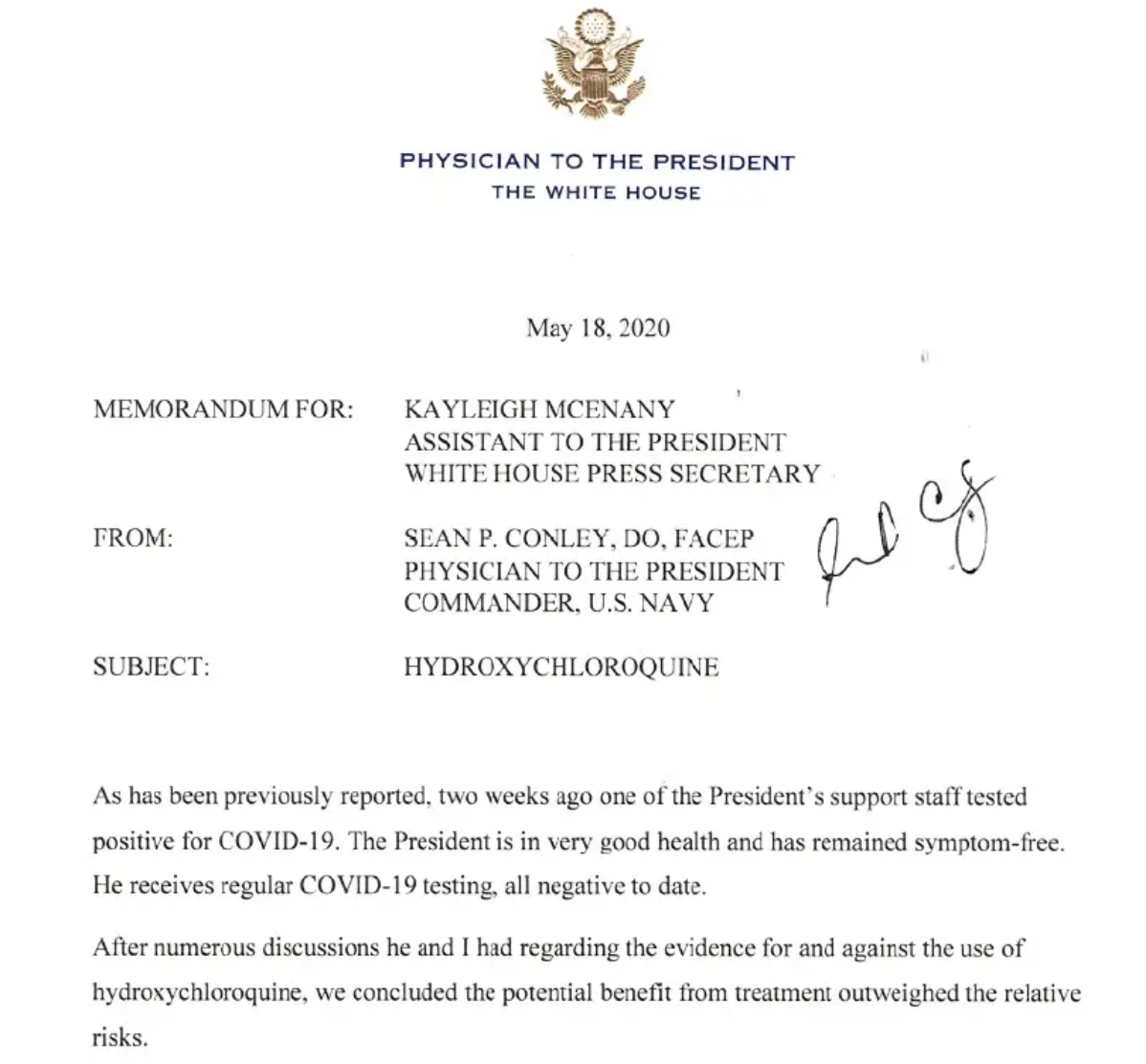
White HouseDr. Sean Conley on President Trump’s use of hydroxychloroquine on May 18, 2020.
On May 18, Trump revealed he had been taking hydroxychloroquine as a precautionary measure to protect him from the coronavirus. The anti-malarial drug was briefly considered as a possible treatment for the virus. But the FDA cautioned at the time that the drug should only be used in controlled clinical trials due to the risk of serious side effects such as heart rhythm problems, CNN reported. Health officials later concluded hydroxychloroquine was not effective against COVID-19, Business Insider reported.
Conley addressed Trump’s decision to use hydroxychloroquine in an official White House memo, which can be seen here. Conley explained in part:
After numerous discussions (Trump) and I had regarding the evidence for and against the use of hydroxychloroquine, we concluded the potential benefit from treatment outweighed the relative risks.
In consultation with our inter-agency partners and subject matter experts around the country, I continue to monitor the myriad studies investigating potential COVID-19 therapies, and I anticipate employing the same shared medical decision making based on the evidence at hand in the future.
4. Conley Is Married to a Fellow Doctor & They Have 3 Children
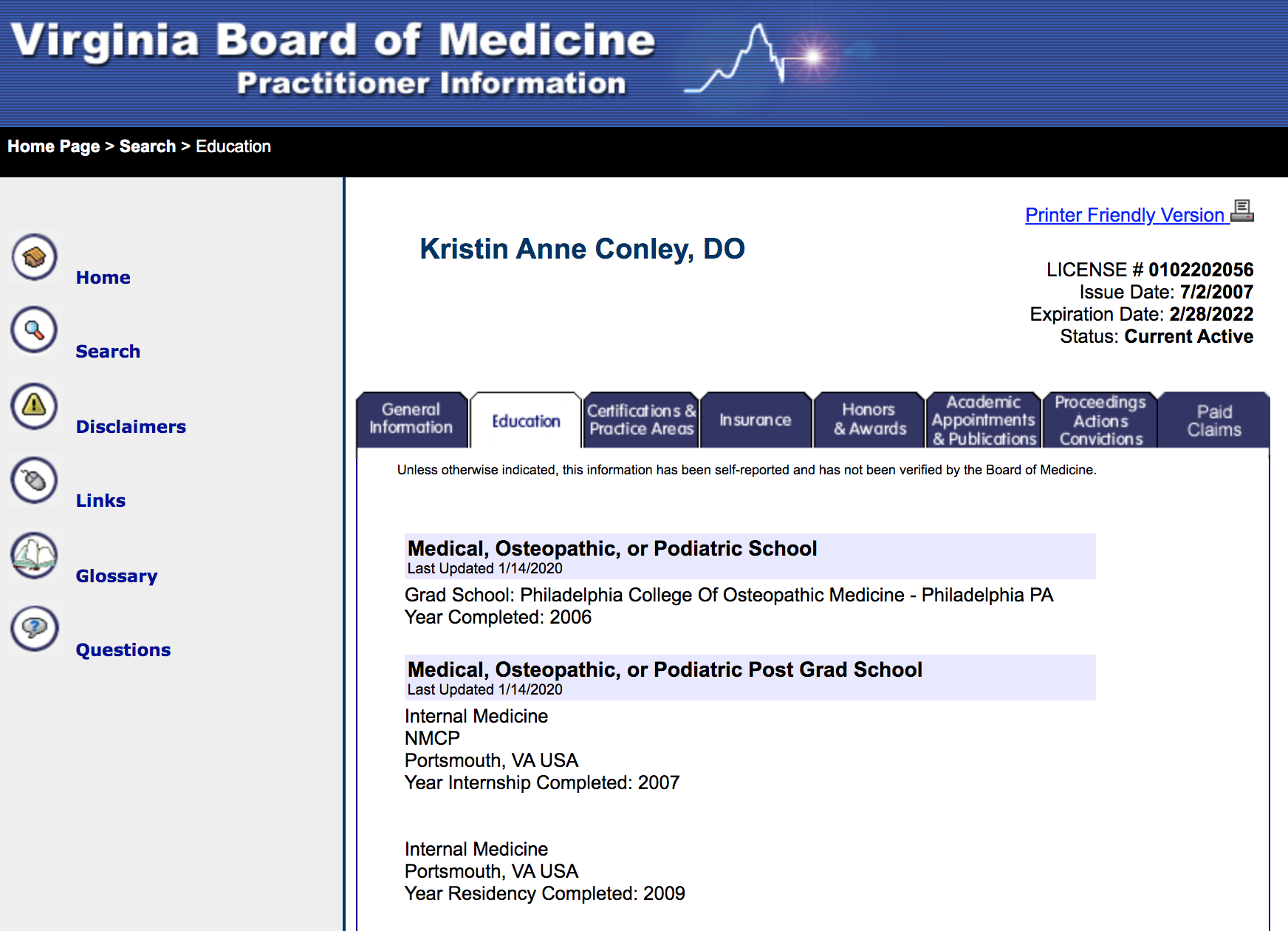
Virginia Board of MedicineWhite House physician Sean Conley is married to a fellow doctor, Kristin Conley.
Conley attended medical school with his wife, Dr. Kristin Conley. According to her profile on the Virginia Board of Medicine website, she also graduated from the Philadelphia College Of Osteopathic Medicine in 2006. Like her husband, she completed her residency at the Naval Medical Center in Portsmouth, but her specialty was internal medicine. Kristin Conley is part of the Frederick Health Medical Group in Maryland.
Kristin Conley was honored as the Working Mother of the Year in 2016 by Working Mother magazine. For the profile, she shared that she and Sean Conley’s first son, Padraig, was born during their residency programs. Younger son Garrett arrived soon after Kristin Conley completed “serving in the Navy onboard a ship.” Their daughter, Emily, was born while Sean Conley was in Afghanistan.
5. Conley Grew Up in Eastern Pennsylvania & Graduated From Notre Dame
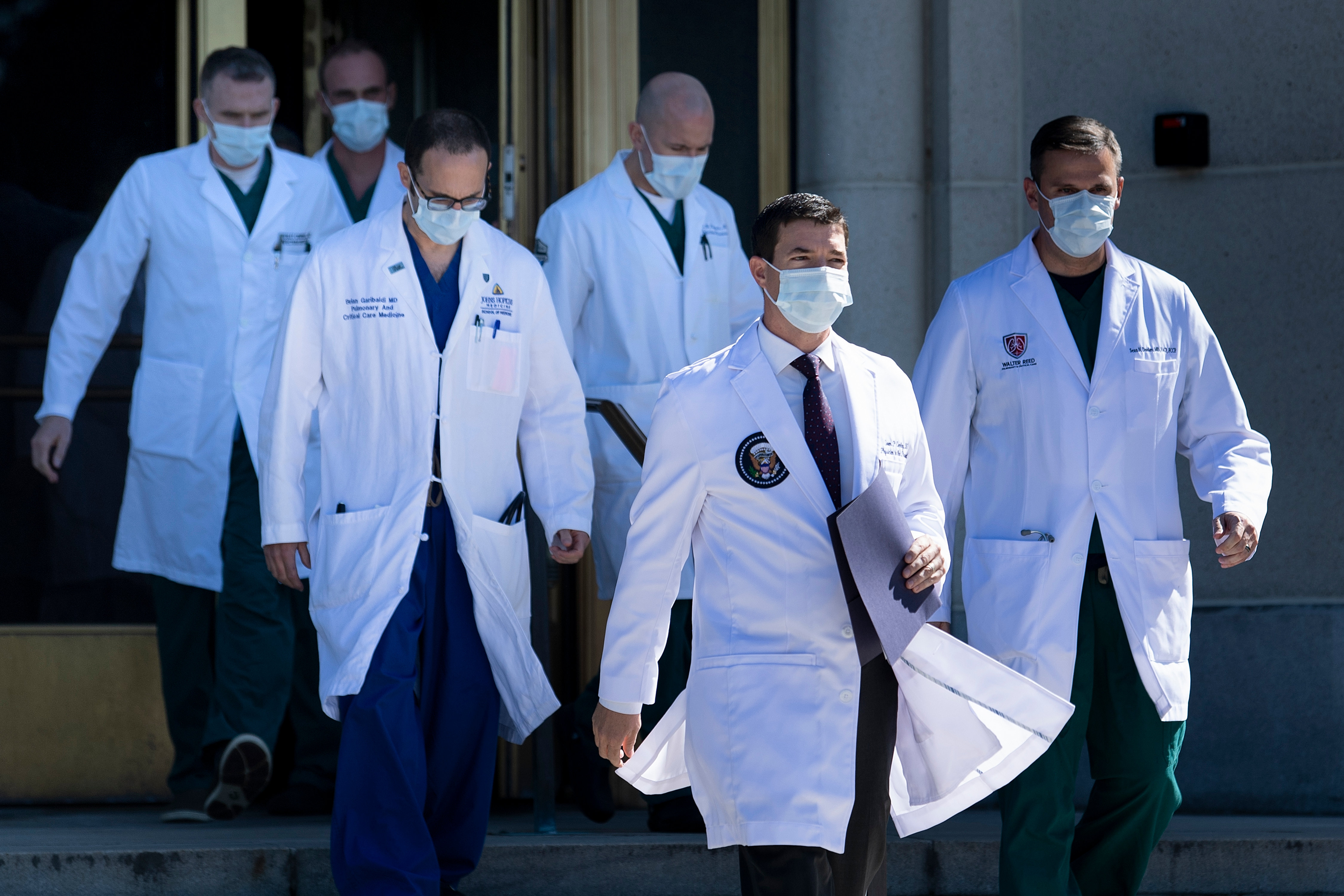
Getty White House physician Sean Conley (2nd R), with medical staff, arrives to give an update on the condition of President Donald Trump, on October 3, 2020, at Walter Reed Medical Center in Bethesda, Maryland.
Conley grew up in Doylestown, Pennsylvania, located about 40 miles north of Philadelphia. According to the Bucks County Courier Times, Conley graduated from Central Bucks High School East in Buckingham in 1998.
Conley attended the University of Notre Dame for his undergraduate education. Conley noted on his LinkedIn profile that he earned a bachelor’s degree in “Science Pre-Professional Studies” in 2002.
Conley took over as the White House physician in March 2018. He replaced Dr. Ronny Jackson, who once declared that Trump’s “excellent” health was due in part to good genes. “Some people have just great genes. I told the president that if he had a healthier diet over the last 20 years, he might live to be 200 years old,” Vox quoted Jackson in January 2018. Jackson was nominated to lead the Department of Veterans Affairs but dropped out of consideration after colleagues accused him of overprescribing pills to patients and drinking alcohol while at work, Politico reported. Jackson denied the allegations.
READ NEXT: Dr. Anthony Fauci’s Wife, Christine Grady: 5 Fast Facts